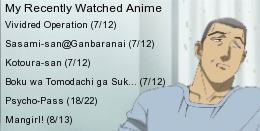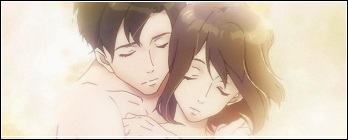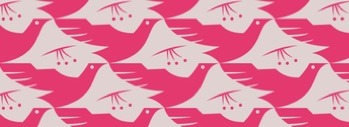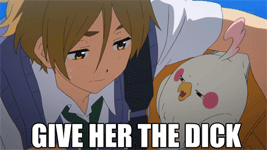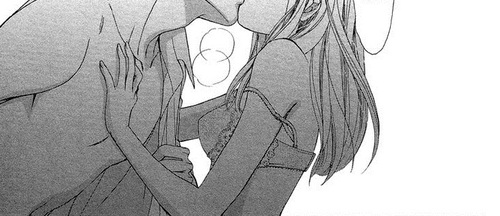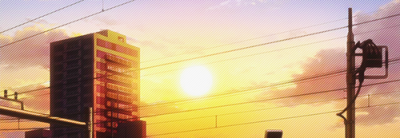Tsk, tsk, Ryuuko, you out of all people should know better than calling your assaultor a pervert, still falling back to the same thought pattern of prudery, suspecting sexual connotations whenever it comes to (the unwrapping of) your body, even after getting lectured by Satsuki about the proper way to wear one's clothes, which is to wear it with pride and to act accordingly ;)
▶ Once again Kill La Kill proves its absolute superiority with its latest episode.
This show simply bursts with creativity while still retaining its old-school feeling by paying homage to 70' and 80' anime. Lots of interestingly framed shots and this show's style of colouring never ceases to impress me by creating great contrasts and thus accentuating each scene to its fullest.
Everything just oozes style but despite its sheer amount of seeming absurdity quite some substance can be found beneath the flashy visuals.
And lots of plot progression this time, too, for those who set a high value on that...
▶ A third party gets introduced: Tsumugu Kinagase, a member of the Anti-Uniform Guerilla, an organization which doesn't only oppose Honnouji Academy but also (as their name implies) uniforms, especially those which carry dangerous potential such as the Kamui.
Additionally homeroom teacher Aikurou Mikisugi reveals himself as part of the "Nudist Beach" group, whatever its name may entail though seeing his tendencies to peel off his clothes at certain times it seems quite fitting. Remember the aneasthesia syringes he used to disable Ryuuko in episode 2?
Looks like people against clothing in this show often tend to carry around sharp and paralyzing utensils. Oh, the irony of using sewing needles as a weapon against those who rely on clothes as their resource of power.
▶ Anyway, more importantly, KLK has hammered home just how clothing represents THE most important motif of this show everything, really everything revolves around. Ryuuko herself undergoes a significant change in this episode. At the beginning only a piece of clothing as she says herself before her fight with Tsumugu, a measure to achieve her goals, Senketsu turns into someone she considers a dear friend, actually the only "person" beside Mako who supports her on a personal level.
▶ Because really, Ryuuko is awefully lonely when you look closely: An orphant who lost her parents at a young age transfers to this to her foreign city where she doesn't know anyone. She gets bullied at school everyday by the student council and various clubs and constantly gets harrassed by members of the opposite sex. Her only friend is a weirdo who also becomes a target of mentioned ones' bullying just by associating with her. From this point of view Mako's talk about Ryuuko's loneliness and supposed delusions and her escaping into a fantasy world by treating her school uniform(!) as an imaginary friend takes on a completely different meaning. Appropriately we get to see Ryuuko in her most vulnerable state up to this point when she gets bereaved of her uniform, an unsually grim moment in this otherwise high-energy and light-hearted show. Not to mention this episode contained two scenes of Ryuuko losing Mako and Senketsu respectively showing how accustomed/dependent she has become to them.
▶ Clothes make the man. Clothes grant power. Power leads to corruption. Using Honnouj Academy as an example it isn't difficult to see where Tsumugu's animosity against uniforms stems from. The fascistic nature of its school directly thrives on military uniform-based sailor fuku and gakuran (hello, social commentary on Japanese educational facilities). The youth that gets brought up this way is entirely focused on achievements and performance, lacking social kindness and accepting social inequality as a given, even going so far as to sabotage those who yearn to escape poverty as depicted the previous week.
▶ "People and Clothing ARE enemies" is what Tsugumu believes in. In this context he perceives Life Fibers the Kamui are made of as parasites, demonic creatures which lull their wearers into a false sense of security only to take advantage of them eventually. On a meta-level, however, it could point to how different clothes divide people into different status and causes social distinctions directly rather than being a mere symptom thereof which couldn't be more true when applied to the world KLK is set in. That would explain the existence of the "Nudist" organization as it rejects clothing as the fundamental basis of their ideology in order to reset the disrupture caused by the concept of clothing. Perhaps it's a bit far-fetched but I wouldn't put it past the producers to have thought of that.
|

